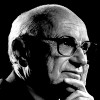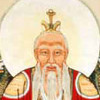“ The ordinary man is always doing things, yet many more are left to be done. The kind man does something, yet something remains undone. The just man does something, and leaves many things to be done. The moral man does something, and when no one responds he rolls up his sleeves and uses force. ”
Lao Tzu, Tao Te Ching (4th century BC). copy citation
| Author | Lao Tzu |
|---|---|
| Source | Tao Te Ching |
| Topic | force ordinary |
| Date | 4th century BC |
| Language | English |
| Reference | |
| Note | Translated by Stephen Mitchell |
| Weblink | https://terebess.hu/english/tao/mitchell.html |
Context
“The Master doesn't try to be powerful;
thus he is truly powerful.
The ordinary man keeps reaching for power;
thus he never has enough. The Master does nothing,
yet he leaves nothing undone.
The ordinary man is always doing things,
yet many more are left to be done. The kind man does something,
yet something remains undone.
The just man does something,
and leaves many things to be done.
The moral man does something,
and when no one responds
he rolls up his sleeves and uses force. When the Tao is lost, there is goodness.
When goodness is lost, there is morality.
When morality is lost, there is ritual.
Ritual is the husk of true faith,
the beginning of chaos. Therefore the Master concerns himself”
source



